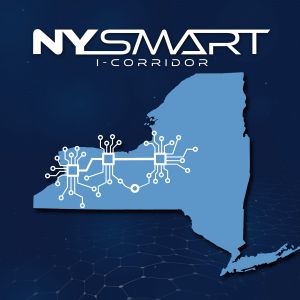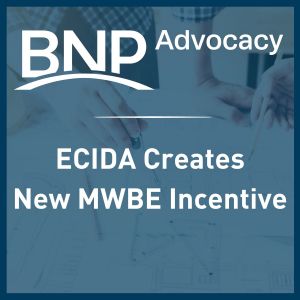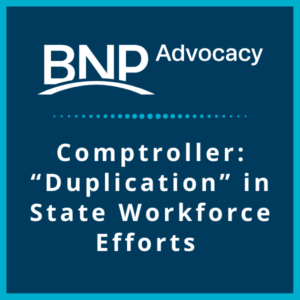BNP Advocacy Alert – NYS Budget Update
Blog Categories
April 8, 2021

Advocacy Alert: NYS Budget Finalized
Governor Cuomo and members of the State Legislature have agreed on a new state budget for FY 2022. The $212 billion spending plan includes, among many other provisions, tax increases, a grant program focused on businesses most impacted by COVID-19, and the legalization mobile sports betting. The budget allocates $5.5 billion of the $12.6 billion of aid provided to New York from the federal government as part of the American Rescue Plan Act of 2021. State leaders say the remaining federal funds will be applied to future budgets.
The Governor entered budget negotiations weakened as he battles mounting calls for his resignation as well an impeachment investigation being conducted by the Assembly stemming from multiple sexual harassment allegations and the underreporting of nursing home deaths from COVID-19. As a result, the Legislature outright rejected some of the Governor’s proposals in his budget plan and the final agreement reflects several of the Legislature’s priorities.
Taxes, Tax Credits & Fees
Middle-Class Tax Cuts: The Legislature rejected the Governor’s plan to delay implementation of the ongoing middle-class tax cuts for one year. First passed in 2017, the tax cuts will continue to reduce PIT rates for the middle-class taxpayers up to 20 percent when fully phased in through 2025. The BNP advocated for these planned tax cuts to continue without delay.
Personal Income Taxes: The budget includes a PIT increase for single filers reporting more than $1 million and joint filers reporting more than $2 million taking the tax rate from 8.82% to 9.65%. The agreement also establishes two additional taxes brackets – income over $5 million taxed at 10.3% and income over $25 million taxed at 10.9%. These increases and new brackets are scheduled to run through tax year 2027.
Corporate Franchise Tax: The budget agreement increases the corporate franchise tax rate from 6.5% to 7.25% for three years through 2023. The increase applies to businesses with income of more than $5 million. The tax increase will bring another $750 million into the state’s coffers and $1 billion next fiscal year.
Brownfield Tax Credits: Current BCP tax credits have been extended for two years to reflect construction and project delays related to COVID-19. The BNP advocated for this extension.
Film Tax Credit: The current Empire State Film Production Credit and Empire State Film Post-Production Credit have been extended for one year.
Wage and Withholding Filing Penalty: Employers will now face a stiffer penalty for failing to provide complete and accurate wage reporting and withholding reports to employees. The current fine of $50 per employee will double to $100.
Hire-A-Vet Tax Credit: The budget agreement extends the available tax credits for hiring a veteran for one additional year. The BNP advocated for this extension.
Historic Rehabilitation Tax Credit: The budget expands the tax credit available to qualifying historic rehabilitation projects by including projects that cost $2.5 million or less.
The Legislature did not buy into the Governor’s proposed DMV ‘convenience’ fee and the final agreement scrapped plans advanced by some legislators to raise the estate tax, increase taxes on capital gains, and reinstate the Alternative Minimum Tax.
Mobile Sports Wagering
The budget legalizes mobile sports wagering in New York with estimated annual revenues topping out at more than $500 million when fully phased in. New York will now issue Requests for Applications to begin the process of selecting at least two platform providers. Most of the revenue derived from mobile sports wagering will be earmarked for education with a small percentage dedicated to youth sports and to public awareness efforts focused on problem gambling.
COVID-19 Relief & Response
Testing and Vaccine Deployment: The budget provides ongoing funding to support the state’s testing capabilities and infrastructure, as well as the continued equitable deployment of the COVID-19 vaccine.
Small Business and Arts Relief and Recovery Assistance: The budget establishes a $1 billion fund to provide grants and tax credits to small businesses, restaurants, and arts and entertaining venues most impacted by COVID-19, including the:
- COVID-19 Pandemic Small Business Recovery Grant Program: $800 million in grant funding for small businesses impacted by CVODI-19 shutdowns.
- Restaurant Return-To-Work Tax Credit: $35 million in tax credits to support restaurants hard hit by the pandemic through 2021.
- Arts and Cultural Organization Recovery Grant Program: $40 million in grants toeligible arts and cultural nonprofit organizations
- Musical and Theatrical Production Tax Credit: Extends the current tax credit for musical and theatrical productions outside of NYC for four years through 2025 and doubles its value to $8 million.
Childcare: The budget agreement address growing childcare needs in several ways. It expands and increases tax credits available to employers who provided childcare to employees. The budget also allocates more than $2 billion in federal funding to expand childcare access by increasing subsidies to eligible families and offers essential workers childcare support. Federal funds will also be used to help childcare providers through grants to stabilize their businesses due to revenue loss and cover the costs of ongoing COVID-19 protections. The BNP advocated for direct support for childcare providers to ensure Buffalo Niagara families have access to affordable, reliable, and high-quality childcare.
COVID-19 Recovery Workforce Initiative: The budget allocates $50 million for employer-driven training for low-income workers, as well training opportunities for small business to hire furloughed, laid-off or new employees.
Excluded Workers Fund: The budget allocates $2.1 billion for cash payments to New Yorkers who had income loss during the pandemic but were ineligible for unemployment insurance or federal stimulus payments because of their immigration status. The benefit can be as much as $15,000. This fund was one of the most contentious issues debated during budget negotiations.
Infectious Diseases Resiliency Commercialization Fund: The budget allocates $40 million to support the growth of state businesses focused on innovations related to infectious disease prevention and response, as well emerging public health threats. The BNP advocated for the creation of this fund.
New York Public Health Corps: The budget creates the New York Public Health Corps which will consist of students training in medical fields and well as retired medical personnel and volunteer first responders to help assist in the deployment of COVID-19 vaccine and activity associated with responding to future public health challenges.
Transportation & Infrastructure
NYSDOT Capital Program 2021-2022: The budget agreement includes more than $1 billion in funding dedicated to local roads and bridges across New York representing an increase of more than 32 percent. In addition to releasing $90 million in local highway aid that was held up last year, the Capital Program includes:
- CHIPS Funding: Legislators made it priority to increase funding to the Consolidated Local Street and Highways Improvement Programs or CHIPS after the Governor proposed freezing funding for another year. A major source of funding for local road repair, CHIPS will see a $100 million add taking the program spend up to $538 million or a nearly 23 percent increases from its current allocation which has remained unchanged since 2013.
- Extreme Winter Recovery Funds: The Legislature also rejected the Governor’s plan to zero out this program used to help repair roadways damaged by winter weather conditions. The final budget adds $35 million to the $65 million Cuomo proposed cutting for a total of $100 million.
- City Touring Roads Initiative: The Legislature created a new $100 million program to help fund local roadway repair in cities, towns, and villages. Allocations will be formula based. Senator Tim Kennedy, Chair of the NYS Senate Transportation Committee, estimates the City of Buffalo will receive $9.3 million as part of this initiative.
- PAVE-NY: The budget agreement adds $50 million to the PAVE-NY program for a total of $150 million. The program prioritizes local roadway improvements that are directly tied to job growth and economic competitiveness.
Education
School Aid: The budget allocates $29.5 billion to K-12 schools, an increase of $3 billion or 11 percent. This is highest level of state aid ever adopted. This aid is in addition to the billions of federal dollars allocated to assist school districts in continuing to respond to COVID-19 and cover the costs associated with reopening to in-person instruction. The budget also includes funding for full-day pre-K for four-year-old students across the state, and provides an additional $500 million in emergency assistance to non-public schools.
Higher Education: The budget provides $7.7 billion in assistance to higher educational institutions, an increase of $283 million. The budget also includes an additional $25 million in support for community colleges.
Capital Funding: The state is investing an additional $1 billion in capital projects at SUNY and CUNY schools. The BNP has long advocated for additional capital support for SUNY.
Tuition Assistance Program: The budget increases the maximum TAP award by $500 to $5,665. This move is estimated to impact 185,000 students attending public and private colleges across New York. The BNP advocated for this increase. The budget also establishes a plan to bridge the gap between TAP awards and SUNY tuition credits by the 2024-25 academic year.
Broadband
Low Income Internet Program: The budget creates a new mandate requiring internet providers to provide at least 25 mbps of broadband (federal benchmark for high-speed) for $15 per month. Consumers who receive free/reduced school lunch, SNAP, Medicaid, senior or disability rent exemptions, or affordability benefits from utilities will be eligible.
ConnectED NY: Through a public-private partnership with Schmidt Futures and the Ford Foundation, an emergency fund has been created to provide 50,000 low-income students with free internet through June 2022.
Economic Development
The budget funds another round of both the Regional Economic Development Councils at $750 million and the Downtown Revitalization initiative at $100 million.
Environment
Mother Nature Bond Act: A repeat provision for last year, the budget agreement includes a $3 billion bond act to address shoreline restoration, flood mitigation, and water infrastructure. The bond act will go before voters in November 2022 for approval. The Governor’s office chose not to include the bond act on the ballot last November citing the pandemic.
Environmental Protection Fund: A $300 million add to the state’s Environmental Protection Fund which pays for projects to conserve open space, infrastructure in state parks, and other environmental priorities.
Energy
Offshore Wind: The state plans to construct two new offshore wind farms off the coast of Long Island. Additionally, the state will invest $20 million in an Offshore Wind Training Institute to train up to 2,500 workers for offshore wind-related employment.
Transmission: The budget invests $2 billion in the construction of an electric transmission “superhighway” in order to connect new renewable energy generation facilities to the power grid.
Renewable Energy Construction: The state plans to add 24 new renewable energy projects this year. The budget also invests in wind turbine manufacturing facilities in Albany, Port Jefferson, and Montauk Harbor.
Uniform Assessment for Solar and Wind Projects: Language in the budget requires the Department of Taxation and Finance, in collaboration with NYSERDA and the NYS Assessors' Association, to develop a uniform property tax assessment model for wind and solar projects. The language requires the state to consider economic and regional characteristics in crafting the uniform model.
The BNP will continue to keep our members updated on the new state budget and how it will impact key industries in the weeks ahead.
Related Posts
Buffalo, Rochester, and Syracuse Region Can Become America’s Semiconductor Superhighway
After years of relentless advocacy to bolster Upstate NY’s innovation and manufacturing industries, U.S. Senate Majority Leader Charles E. Schumer and U.S. Congressman Brian Higgins announced the Buffalo-Rochester-Syracuse region have joined forces with a proposal to become a federally-designated Tech Hub in the first-of-its-kind nationwide competition created in his CHIPS & Science Bill.
How the U.S. Is Closing the Door to Top Talent
The BNP organized a Capital Conversations event as part of our Government Affairs series to examine the workings of the H-1B program and explore potential reforms that could strengthen our regional economy.
ECIDA Creates New MWBE Incentive
The Erie County Industrial Development Agency recently approved a new incentive for MWBE subcontractor utilization, known as the Economic Inclusion Program.
Comptroller: “Duplication” in State Workforce Efforts
New York State Comptroller Tom DiNapoli recently released a report assessing the state Department of Labor’s workforce development efforts. The report found significant overlap, duplication, gaps, and fragmentation in state workforce development programs and services. The audit found that New York offers over 500 workforce development programs and services, administered




